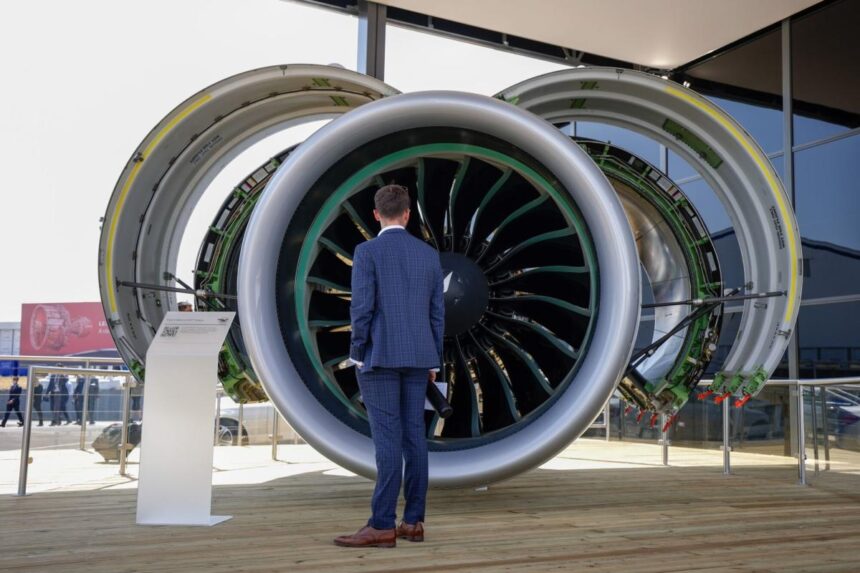(Bloomberg) — RTX Corp. dramatically expanded the scope of required engine checks at its Pratt & Whitney unit, a move that will affect nearly its entire fleet of turbines powering Airbus SE’s latest A320 and ground hundreds of the single-aisle jets for months.
Most Read from Bloomberg
About 3,000 Pratt & Whitney geared turbofan engines must be removed over the next three years to check for potentially flawed components made from contaminated metal powder, RTX said Monday. That represents most of the roughly 3,200 GTF engines currently in service on the jets.
With airlines already facing lengthy waits for engine repairs, the added work will result in about 350 aircraft parked per year through 2026 on average, RTX executives told analysts. They said they expect the figure to peak at about 650 planes in the first half of 2024.
“This is obviously a difficult and disappointing situation,” Chief Executive Officer Greg Hayes said. “We’re laser focused on addressing this in the most expeditious and financially sound way forward.”
The broad extent of the checks highlights how the engine’s latest problem has deeply impacted the global fleet. The Pratt geared turbofan engine is one of two power plants offered on the top-selling Airbus A320neo family of aircraft. The RTX unit has about a 40% share of the A320neo market, behind competitor CFM International.
And it’s yet another blow to airlines as they work to rebuild their operations since the pandemic. The engine troubles complicate efforts to increase capacity to meet steady post-Covid lockdown demand for travel.
RTX fell as much as 8.1% Monday as of 2:15 p.m. in New York, the most since the company disclosed the contamination flaw in late July. The shares have declined more than 20% this year.
Financial Hit
On Monday, RTX also cut its full-year sales outlook and said it will take a roughly $3 billion pretax charge in the third quarter as it addresses the flawed parts. Part of RTX’s plan to resolve the issue is offering compensation to airlines for operational disruptions.
The Arlington, Virginia-based company now expects reported fiscal year sales in a range of $67.5 billion to $68.5 billion it said in a statement. An earlier forecast called for adjusted sales of $73 billion to $74 billion, compared with an average analyst estimate for $73.6 billion.
RTX said pretax operating profit will be reduced by as much as $3.5 billion over the next several years over the issue.
Several airlines have already said the inspection requirements will weigh on their plans. Ultra—low cost carrier Wizz Air Holdings Plc on Monday said the inspections will reduce its capacity up to 10% in 2024.
However, Airbus said it doesn’t expect the updated plan from RTX to affect the planemaker’s delivery targets this year, or its plan to ramp up production of A320-series jets over the course of 2024.
Expanded Scope
RTX said in July that 1,200 GTF engines must be removed and inspected over the next 12 months. That initial assessment came after the company discovered contamination in the powdered metal used to manufacture high-pressure turbine disks could shorten their lifespan.
The new plan is to inspect 3,000 engines through 2026 and bring the equipment in for repetitive examinations every 2,800 to 3,800 flights, the company said. That’s a much shorter interval than the typical industry standard.
During the shop visits, Pratt plans to replace as many high-pressure turbine disks as possible with new parts that have a full service life, in order to avoid future inspections, RTX Chief Operating Officer Chris Calio told analysts.
In July, the company suggested fewer than 1% of engines it had inspected needed new disks. Now, engines will also be fitted with new compressor disks, another step that wasn’t part of the plan outlined in July.
‘Wary’ Investors
Vertical Research analyst Rob Stallard said the $3.5 billion financial hit was larger than feared, after the company earlier estimated that the first 200 engines needing inspections would reduce free cash flow by $500 million this year.
“We think investors are likely to remain a little wary of the RTX stock, as the industry’s track record of dealing with execution issues has not been great in recent years,” he said in a research note.
MTU Aero Engines, which is a partner on the GTF engine, said in a separate statement that it expects a €1 billion impact on its earnings before interest and taxes in the current financial year. It also expects an impact on its liquidity in the financial years from 2024 to 2026.
RTX has said the first 200 turbines will need accelerated removals by mid-September.
(Updates Airbus comment, Wizz impact and additional detail from first paragraph.)
Most Read from Bloomberg Businessweek
©2023 Bloomberg L.P.








